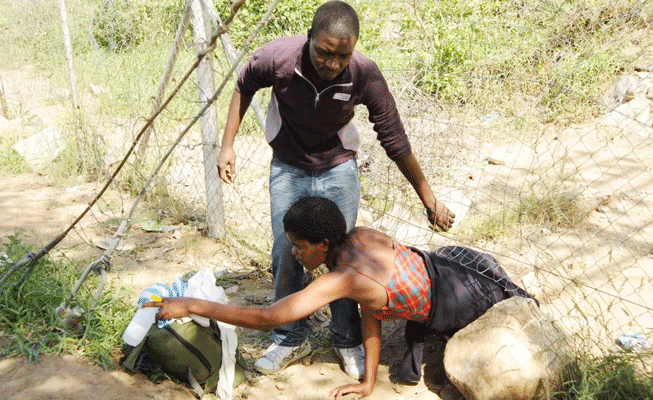
health talk:with Dr Johannes Marisa
Covid-19 is a dreaded virus that has shaken the entire world with 350 769 casualties as of Thursday last week. While the talk about the virus seems fading by the day, the sound from the incidence and mortality is a cause for concern. The United States tops the list of both morbidity and mortality, but Africa remains relatively safer than Europe, South America and Asia. If the prevalence in Africa is as reflected in the reported cases, then we can safely boast of divine cover and protection. Zimbabwe by Thursday had reported 132 cases of the dreaded infection of which 76 cases were reported in one day. Quarantine centres in Masvingo and Beitbridge had rung the caution bells. What a pity!
Covid-19 infection, like many other diseases, requires a robust health system in order to contain it. A health system consists of all organisations, institutions, resources and people whose primary purpose is to improve health. In 2007, the World Health Organisation (WHO) proposed a framework which describes health system in terms of six building blocks, namely service delivery, health workforce, health information systems, access to essential medicines, financing and leadership. The WHO monitoring framework therefore recognised that sound and reliable information is the foundation of decision-making across all health system building blocks. Today, government, like many other nations worldwide, has done all that it could to contain the coronavirus by mainly focusing on public health measures that include lockdowns, social distancing, hand washing, surveillance, testing, contact tracing and quarantine. However, we hear of a sudden spike in cases and we ought to plug the holes if they are pluggable. From the building blocks, where are we failing as a nation? For sure, financing, health workforce and service delivery easily crop into our heads. The following factors have contributed to our troubles as we battle to control Covid-19:
Porous border: Many returnees are evading the screening and quarantine processes at the border. Consequently, some become border jumpers, getting into Zimbabwe through areas like Chiqualaquala, Chikombedzi and Gezani in the south-eastern part of the country having traversed Kruger National Park in South Africa. This is not good news for us as a nation. Lately, many of the cases have come from across borders with 75 people on Wednesday testing positive while in quarantine centres in Masvingo and Beitbridge. It is not known whether those were all imported cases or mere incidences of local transmission in the quarantine centres.
We cannot reject our returning brothers and sisters, but we should keep a close watch on them. South Africa had more than 25 937 cases as of Thursday, so Beitbridge border becomes the riskiest of all the borders we have. It would thus be prudent for security forces to do intensive patrols in order to curtail the unwanted crossing of people along the borders. The more we get border jumpers from countries like South Africa, the more we get the Covid-19 risk.
Negligence and corruption: Negligence is defined as failure to take proper care of something. Yes, we have people who have been put in quarantine centres, but we hear so far more than 118 people have escaped from quarantine centres, a bomb which can explode at a bus terminus indeed. Rumour had it that some rich returnees would buy their way out of quarantine centres because they were reluctant to stay for 21 days in the secluded places. How come quarantine centres, which are supposed to be kept as high-security areas in this era lose more than 118 people simply because of escape? Corruption could be killing us this time.
Let us guard against unethical ways of survival.
Inadequate PPE: Personal protective equipment (PPE) has never been in adequate supplies in many countries in the world, including in Great Britain. However, the few available resources should be put to good use. There are so many clinics and hospitals that do not have enough of PPE even before real attacks of Covid-19 appear. Private practitioners are not spared. Private practitioners, as the first ports of calls by patients, should be protected if the war against Covid-19 is to be won. I am not sure where those who claim to run successful churches are at the moment where the entire nation is grappling with misery about coronavirus and resource mobilisation. According to WHO, health workforce refers to anyone who has a health background and expertise to deliver health to the people. There should never be separation of tasks between public and private health workers as both groups can be affected in the same way especially considering the virulence of Covid-19.
- Chamisa under fire over US$120K donation
- Mavhunga puts DeMbare into Chibuku quarterfinals
- Pension funds bet on Cabora Bassa oilfields
- Councils defy govt fire tender directive
Keep Reading
Security officers have not been spared in terms of PPE. How do we expect a police officer without protective gear to arrest border jumpers from South Africa? If the border jumpers are arrested, where will they be put considering that they are at high risk of being Covid-19 carriers? Are we sure security forces will arrest border jumpers yet they do not have adequate PPE? All these questions can help our nation to move and put correct measures in place if we are to win the war.
Together we will win. Let us practice good hygiene!
l Dr Johannes Marisa is a medical doctor and public health practitioner who can be accessed on [email protected].











